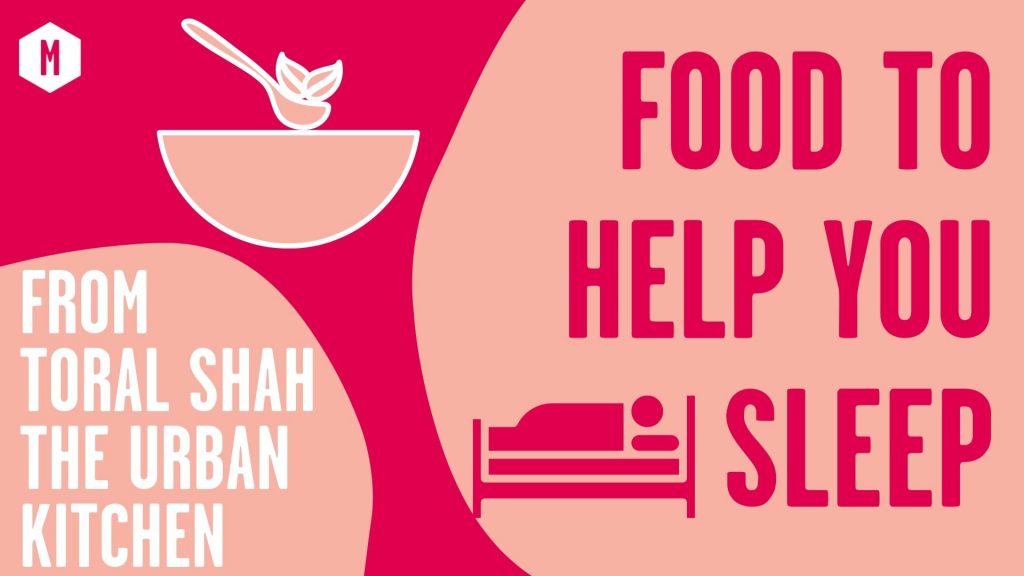
Do you struggle to sleep when you are ill? Did you know nutrition helps better quality sleep? Nutritional scientist Toral Shah founder of The Urban Kitchen explains the best food to help sleep.
Why Food is important to help sleep
Sleep is an incredibly important to both our physical and mental health, with the quality of our sleep as important as the quantity of sleep that we get. When you are chronically ill or recovering from illness, your sleep may be disrupted for many reasons. We know that being sleep deprived can reduce our brain functions, increase our sensitivity to pain, and hunger. The latest research shows that sleep deprivation has a huge impact on our immune health and can increase our susceptibility to infection. Your diet and what you can eat can support good quality sleep which will help you to recover. Our guide to food to help sleep and those to avoid should help to you to nod off and make the most of the rest and recovery time.
Melatonin is the natural hormone which regulates your biological clock (circadian rhythms) and simultaneously improves sleep quality. Our bodies release more melatonin (10x more) at night time to help us to sleep. Eating good quality protein will help to balance your hormones and ensure that you have optimum melatonin levels. Melatonin is made by converting an amino acid (one of the building blocks of protein) called tryptophan into serotonin (an important chemical for happiness and wellbeing), and then melatonin. Tryptophan is an essential amino acid which means it cannot be produced by the body on its own, but must be obtained from the food that you eat.
Eating more protein
Foods rich in tryptophan include turkey and other poultry, meat, cheese, yogurt, fish, and eggs, which are also a good source of protein. Eating more tryptophan increases the production of melatonin which can support better sleep. Vegan sources of tryptophan include seaweed, soy, spinach, pumpkin and sunflower seeds, almonds, dates and legumes. Milk is particularly high in tryptophan so the mother’s advice of having hot milk at bed has plenty of evidence to support it.
Eat low glycaemic index foods
Low glycaemic foods such as vegetables, beans, whole grains and high protein foods produce a slow, steady rise in blood insulin that helps tryptophan enter the brain. Your body then quickly uses tryptophan to make serotonin, a neurotransmitter that helps induce sleepiness along with improving your mood.
Eat more fish and Vitamin B6
Most fish, especially salmon, halibut and tuna, are packed with vitamin B6, which is needed to convert serotonin into melatonin, the sleep inducing hormone. (The Marine Conservation Society provides information on sourcing and buying sustainable seafood.) There are vitamin B6 rich foods for those of your that don’t eat fish including bananas , quinoa, squash, hazelnuts, chestnuts, sesame seeds and chickpeas. A deficiency in B6 has been linked with lowered serotonin levels and poor sleep and is also linked to symptoms of depression and mood disorders which can lead to insomnia.
Eat more whole grains and magnesium rich foods
Bulgar and barley are both rich in magnesium which is known as the relaxation and anti-stress mineral. Magnesium not only encourages relaxation but will help balance your system so you have better quality sleep. Dark leafy greens, nuts, seeds, fish and avocado all contain large amounts of magnesium.
Eat more calcium rich foods
Women need plenty of calcium rich foods such as green leafy vegetables or dairy foods to maintain bone health and prevent osteoporosis. Broccoli and kale are top choices here to add to one meal a day. Some studies have suggested that being calcium deficient may make it difficult to fall asleep.
Eat more melatonin rich foods
There are plenty of foods that are rich in natural melatonin including tart cherries and cherry juice. Other foods that contain melatonin include corn, asparagus, tomatoes, pomegranate, olives, grapes, broccoli, cucumber.
What to avoid:
Caffeine
Caffeine is one of the stimulants which interferes with sleep. Coffee, tea, chocolate and fizzy drinks all have caffeine. We suggest cutting out caffeine after 2pm. 25g of dark chocolate has 25 mg of caffeine which is about the same as a quarter of a cup of coffee.
Alcohol
Many people find that a glass of wine makes them feel so relaxed and ready to sleep. However, metabolising alcohol releases sugar and causes many to over-heat. Some studies have shown that alcohol disrupts REM sleep (rapid eye movement sleep) which is critical to a good night’s sleep.
Sugar
Eating sugary treats before bed raises your body temperature and can leave you restless. Eating lots of simple carbohydrates and refined starches can continually cause glucose levels to spike and fall. This will affect insulin metabolism and disrupt the body’s circadian rhythms causing you to wake up in the night.
Foods containing tyramine
Tyramine is an amino acid which is converted to noradrenaline by the body and is a brain stimulant. Foods such as pork, cheese, chocolate, aubergines, tomatoes, potatoes and wine are rich in this amino acid so avoid these foods in the evening if you are not sleeping well.
Spicy foods
Eating spicy food too close to bedtime can disrupt sleep as these foods can cause heartburn, indigestion and acid reflux. Heartburn can be made worse while lying down as it allows the stomach acid into the oesophagus (food pipe) causing discomfort.
Foods high in fat
Eating fatty food late in the evening has been linked to poor, fragmented sleep. Fat triggers the digestive processes and causes release of stomach acids, which can cause heartburn. A high fat diet also impacts the production of orexin, one of the neurotransmitters that helps regulate your circadian rhythms along with melatonin.
Yoga to support sleep and recovery from illness
If you’re struggling to sleep or need support in recovering from illness, why not try our course Gentle Yoga for Times of Illness?
About The Urban Kitchen by Toral Shah:

Toral Shah is a Nutritional Scientist (MSc Nutr Med), Functional Medicine Practitioner, Food and Health writer and Consultant, as well as the Founder of The Urban Kitchen. She originally went to medical school with a view to becoming an oncologist but when her mother was diagnosed with breast cancer, she realised that this was not the career for her. Toral Shah is a Nutritional Scientist (MSc Nutr Med), Functional Medicine Practitioner, Food and Health writer and Consultant, as well as the Founder of The Urban Kitchen. She originally went to medical school with a view to becoming an oncologist but when her mother was diagnosed with breast cancer, she realised that this was not the career for her.





Leave a Reply